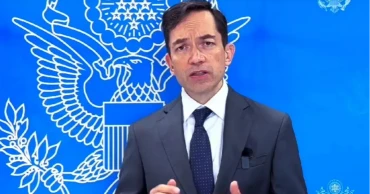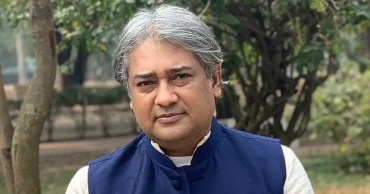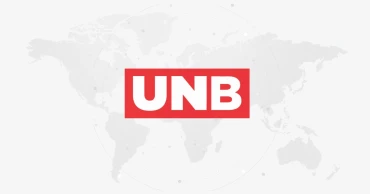US Secretary of State Antony Blinken
What could be the possible reasons to apply US visa restrictions against someone?
The United States has said its visa restriction policy can be applied to anyone "found to be undermining" democratic elections in Bangladesh.
“This could include vote rigging, intimidating voters, use of violence to prevent people from exercising their rights to freedom of association and freedom of peaceful assembly, and the use of measures designed to prevent political parties, voters, civil society, or the media from participating in the electoral process or expressing their views,” US Embassy Spokesperson Bryan Schiller told UNB while responding to a question.
Read: US Sen. Bob Menendez charged with corruption-related offenses for the second time in 10 years
He came up with the remark when asked whether journalists may also come under visa restrictions.
Clarifying the issue further, the US Embassy in Facebook post said, “We are applying the [visa restriction] policy in a balanced way against anyone [undermining the democratic election process in Bangladesh] - regardless of being pro-government, opposition party, members of law enforcement agencies, members of the judiciary, or media persons.”
The embassy spokesperson said the US Department of State relies on extensive, well-resourced, and fact-checked case-by-case review of credible information about those undermining the democratic process in Bangladesh to determine whether to apply visa restrictions.
Read: Haas raises eyebrows by saying members of media may face visa restrictions
US announces in-person interview waivers for certain visa applicants throughout 2023
The United States has said it will not release the names or numbers of people in Bangladesh subjected to the visa restrictions.
"Visa records are confidential under US law," US Embassy Spokesperson Bryan Schiller told UNB earlier.
But, he said, the US government has looked very closely at incidents since they announced this policy.
"After a careful review of the evidence, we have imposed visa restrictions on members of law enforcement, the ruling party, and the political opposition,” said Bryan Schiller.
Read: 'Smart Bangladesh' needs to harness full potential of women
In May this year, US Secretary of State Antony Blinken announced the new visa policy under Section 212(a)(3)(C) (“3C”) of the Immigration and Nationality Act to support Bangladesh’s goal of holding free, fair, and peaceful national elections.
Under this policy, the United States will restrict the issuance of visas for any Bangladeshi individual, believed to be responsible for, or complicit in, undermining the democratic election process in Bangladesh.
The United States notified the Bangladesh government of this decision on May 3, 2023.
The Department of State on Friday said they are taking steps to impose visa restrictions on Bangladeshi individuals responsible for, or complicit in, undermining the democratic election process in Bangladesh.
Read: European Film Festival presents a true cultural collaboration between Bangladesh, EU: Dutch Ambassador
"Our actions today reflect the continued commitment of the United States to supporting Bangladesh’s goal of peacefully holding free and fair national elections, and to support those seeking to advance democracy globally," said its Spokesperson Matthew Miller in a statement.
These individuals include members of law enforcement, the ruling party, and the political opposition, he said.
"The United States is committed to supporting free and fair elections in Bangladesh that are carried out in a peaceful manner," Miller said.
These persons and members of their immediate family may be found ineligible for entry into the United States.
Additional persons found to have been responsible for, or complicit in, undermining the democratic election process in Bangladesh may also be found ineligible for US visas under this policy in the future, according to the US Department of State.
This includes current and former Bangladeshi officials, members of opposition and ruling political parties, and members of law enforcement, the judiciary, and security services, Miller said.
2 years ago
US visa policy will apply to BNP leaders who are making open declaration to obstruct upcoming polls
Awami League leader Mohammad A. Arafat has sent a letter to US Secretary of State Antony Blinken, hoping that the US new visa policy will apply to those BNP leaders who are making an open declaration to obstruct the upcoming national election in Bangladesh.
"I hope your Visa policy will apply to these people as well," he mentioned in his letter that he also shared from his verified Facebook page.
Read more: Nothing to worry about new US visa policy; don't want arson, violence: Momen
Arafat, a member of the AL central executive committee attached some video footages of some BNP leaders declaring they would obstruct the upcoming national election in Bangladesh.
The AL leader said according to the visa policy that Secretary Blinken announced recently (and the letter that he sent to the FM of Bangladesh), “This policy supports Prime Minister Sheikh Hasina’s stated commitment to hold a free and fair election in Bangladesh and allows the United State to act when Bangladeshi citizen or officials from all political parties undermine this critical pillar of democracy.”
Read more: New visa policy to help PM Hasina's govt in holding fair elections: US
2 years ago
RAB's importance to counterterrorism recognised but lifting sanctions to take time: Blinken
US Secretary of State Antony Blinken has recognized the elite force RAB's important counterterrorism role, but stated that lifting sanctions and resuming training with American forces may take time.
During his bilateral meeting with Foreign Minister AK Abdul Momen at the US State Department on Monday, Secretary Blinken appreciated that Bangladesh is reexamining the Digital Security Act (DSA).
Regarding the human rights related issues, both sides stressed upon the fact that there are some noticeable developments in the last four months.
Foreign Minister Momen emphasized that Bangladeshi law enforcers need training from the US on rules of engagement, and informed that there is an inbuilt system of inquiry in the RAB, which tracks all allegations, based on which a number of personnel have been penalized.
Depicting the context of the creation of RAB in 2004, he underscored that RAB has played a pivotal role in Bangladesh’s counter-terrorism efforts, which may be undermined by the sanctions.
Momen also sought the US Secretary of State’s attention and assistance for realizing the deportation of Rashed Chowdhury, one of the convicted killers of Bangabandhu Sheikh Mujibur Rahman, who is residing in the US.
Also read:Dhaka, Washington economic ties to grow further: Momen
Appreciating ongoing works of the tripartite group on labour rights, he underscored that labour rights is an important determinant of Biden Administration’s foreign policy.
Noting that Bangladesh is not getting development finance due to the labour rights issues, he stressed upon resolving all the impediments.
He positively responded to the proposal of deepening maritime cooperation as two countries have the shared goal of a free and secure Indo-Pacific.
Two side discussed the whole gamut of US-Bangladesh bilateral relations.
Bangladesh Foreign Minister thanked the United States for providing more than 61 million doses of COVID-19 vaccine so far, the highest received by any country from the US.
Referring to the congratulatory letter from US President Joe Biden to Prime Minister Sheikh Hasina, he appreciated that the warmth of the message.
Stating that Bangladesh has made huge socio-economic progress in last 50 years, Foreign Minister Momen termed the US as an all-time friend of Bangladesh in its journey towards development as the largest trading partner as well as the largest investor in accumulated term.
He appreciated that the US has finally determined that genocide took place in Myanmar in 2017, and opined that the US should suspend GSP and reimpose sanctions on Myanmar in order to put pressure so that Myanmar resolves the crisis.
He opined that the US needs to diversify investment portfolio, and can consider investing in the infrastructure sector in Bangladesh.
He depicted Bangladesh’s potential in terms of young population including around 700,000 IT professionals; and also proposed that there may be joint investment proposals in pharmaceutical sectors.
He also urged for assistance from the US in developing blue economy, opining that this may enable two countries to work together in building a secure Indo-Pacific region.
3 years ago
Ties between Bangladeshis, Americans deeper, more intertwined: Secretary Blinken
US Secretary of State Antony Blinken has said the ties between Bangladeshis and Americans grow deeper and more intertwined with every generation as the two countries celebrate five decades of friendship.
“I look forward to seeing what our people will build together in the decades ahead as we continue to follow that star of freedom,” he said in a video message celebrating five decades of diplomatic ties between Bangladesh and the United States.
Secretary Blinken thanked Foreign Minister Dr AK Abdul Momen, who is now in Washington to have a bilateral meeting with his US counterpart; and Bangladesh Ambassador to the US M Shahidul Islam “for being the latest stewards of this crucial” relationship.
For generations, Secretary Blinken said, Bangladeshis have made tremendous contributions to the United States.
He cited the example of the iconic Sears Tower to refer to what the Bangladeshis and Americans can achieve together.
In 1952, Fazlur Rahman Khan was the first Bangladeshi to receive the Fulbright Scholarship to study in the US, completed his PhD and two master's degrees in structural engineering and mechanics, the US Secretary of State mentioned.
Later, he joined an architecture firm in Chicago where he designed an office building for Sears Corporation.
“In 1973, just a year after our countries established diplomatic relations, the iconic Sears Tower was finished in downtown Chicago. Since then, the tower has defined a classic American skyline and it represents just one manifestation of what Americans and Bangladeshis can build together," Blinken said.
Read: Bangladesh, US relations to reach new heights: Blinken to Momen
50 years later, he said the two countries collaborate virtually on every issue that matters to their people.
Secretary Blinken said the two countries have forged partnership to improve public health, strengthening local health systems, bringing down maternal mortality in Bangladesh by two thirds over the last two decades and fighting Covid-19 with 61 million doses of safe, effective vaccines provided by the United States to Bangladeshis.
In 2021, Secretary Blinken said, the US bought more Bangladeshi products than any other country did, representing some US$ 8.3 billion. “We encourage Bangladesh to make progress on workers’ rights to deepen our robust economic partnership.”
He mentioned about joint efforts in tackling clime crisis, Bangladesh’s contributions to peacekeeping and Rohingya crisis noting that the Rohingyas have fled genocide and crimes against humanity committed by the military in Myanmar.
“We commend Bangladesh for hosting nearly 1 million refugees and for continuing to offer support for those efforts as we have since the crisis started,” Secretary Blinken said.
Read: Biden sees stronger Dhaka-Washington ties in future
He also said, "We are tackling the climate crisis together, strengthening the resilience of the communities that are already affected by the rising sea level and more severe storms, investing in clean energy and protecting wetlands and forests in Bangladesh for future generations.”
Blinken said the US and Bangladesh address humanitarian conflicts and crises together, from responding to natural disasters to supporting Bangladesh's role as one of the largest contributors to the UN peacekeeping operations.
He recalled that in February 1972, Senator Ted Kennedy visited Bangladesh and spoke to the students at University of Dhaka and the values that tied the peoples of the two countries – the similar struggles for independence, love for liberty and journeys to follow the star of freedom.
The United States recognized Bangladesh on April 4, 1972, in a press statement from Secretary of State William Rogers.
In addition, Herbert Spivack, the principal U.S. officer in Dhaka, delivered a message from President Richard Nixon to Father of the Nation Bangabandhu Sheikh Mujibur Rahman informing him that the United States government wished to establish diplomatic relations at the ambassadorial level.
3 years ago
New Year: Blinken greets Momen, his family
US Secretary of State Antony Blinken has greeted Foreign Minister Dr AK Abdul Momen and wished his family a joyous and peaceful New Year.
"May you and your family have a joyous holiday season and peaceful New Year," Secretary Blinken wrote in his New Year's message from the US State Department.
4 years ago
Blinken calls up FM Momen; discusses bilateral issues
US Secretary of State Antony Blinken made a phone call to Foreign Minister Dr AK Abdul Momen on Wednesday evening and discussed issues of mutual interests.
The two sides discussed bilateral issues and areas of cooperation between the two countries.
State Minister for Foreign Affairs Md. Shahriar Alam said on the eve of 50th anniversary of the Victory of Bangladesh, the US Secretary of State and Foreign Minister Dr Momen spoke over phone at a length.
“Both renewed the resolve to take forward the relationship further. They also agreed to increased engagement while celebrating 50th anniversary of bilateral relationship,” the State Minister tweeted.
US State Department Spokesperson Ned Price said Secretary of State Antony J. Blinken reaffirmed their long-standing partnership with Bangladesh on development, economic growth, and security.
"The two leaders discussed the importance of human rights and agreed to strengthen bilateral cooperation and address shared global challenges," said the Spokesperson.
Though details could not be known, the Foreign Minister is scheduled to brief the media on Thursday afternoon, highlighting the Indian President’s state visit.
Read: Efforts on to change Washington’s decision of sanctions: FM Momen
He is expected to share more on the telephone conversation with Blinken.
Earlier, US Ambassador to Bangladesh Earl R Miller was summoned by Foreign Secretary Masud Bin Momen on Saturday to convey Dhaka’s “discontent” over the designated sanctions imposed by the US Departments of Treasury and of State on some of the present and former officials of the Rapid Action Battalion (RAB).
Foreign Secretary Momen expressed Bangladesh’s disappointment that the decision was taken "unilaterally" by the US Administration without any prior consultation with the Government of Bangladesh.
He flagged that the issues that were cited for imposing the designated sanctions remained under active discussions, including under the framework of the regular institutional dialogues between the two sides, and that yet the US decision came without any prior intimation.
The Foreign Secretary regretted that the US decided to undermine an agency of the government that had been on the forefront of combating terrorism, drug trafficking and other heinous transnational crimes that were considered to be shared priorities withU successive US administrations.
Read: Sanctions on RAB: FM says impact on relations depends on US
Ambassador Miller took note of the concerns raised by the Government of Bangladesh, and assured of conveying the same to his Capital, said the Ministry of Foreign Affairs.
He concurred that the excellent multifaceted relations between two countries could be further deepened through established consultation mechanisms and high level visits.
Ambassador Miller further expressed the willingness of the US Government to remain closely engaged with the Government of Bangladesh in the coming days on issues of mutual interest.
4 years ago
US Secy of State begins two-day India visit
US Secretary of State Antony Blinken is arriving in India on Tuesday on a two-day visit, his first trip to the subcontinent after assuming office earlier this year.
"Wheels up for my trip to New Delhi and Kuwait City. I look forward to consultations with our partners to further cooperation in support of our shared interests in the Indo-Pacific and Middle East," Secretary Blinken tweeted moments before boarding a flight from Washington DC.
Read: Biden expected to nominate Blinken as secretary of state
During his two-day visit, Secretary Blinken is slated to hold talks with Indian Foreign Minister S Jaishankar and National Security Advisor Ajit Doval. He will also call on Prime Minister Narendra Modi Wednesday before departing for Kuwait, according to External Affairs Ministry.
On the agenda of the talks between the two sides are the situation in Afghanistan, counter-China efforts, Quad vaccine diplomacy and climate change, UNB has learnt.
New Delhi is particularly worried about the implications of the American troops leaving Afghanistan, given the fact that it has so far infused over three billion US dollars worth development aid into that country and the horrific memories of the Taliban's role in the hijacking of an Indian airliner in 1999.
"Secretary Blinken's visit is an opportunity to continue the high-level bilateral dialogue and bolster the India-US global strategic partnership," the Ministry of External Affairs said last week, while announcing the visit.
"Both sides will review the robust and multifaceted India-US bilateral relations, and potential for consolidating them further," the Ministry added.
Read: US Secretary Blinken remembers Xulhaz
In March, US Defence Secretary Lloyd Austin visited India. Apart from holding talks with several senior Indian Ministers and officials, he had called on PM Modi. A month later, US Special Envoy on Climate Change John Kerry came to New Delhi.
4 years ago









